#after i get myself diagnosed by a professional-
Explore tagged Tumblr posts
Text
ya'll please i haven't even finished the 1k requests and we're already nearing 2k.
#narus' corner#life update in the tags that no one asked for because if ya'll know me i say stuff here more than on the actual post for some reason.#im burned out from life - and it's directly affecting the speed i can churn out stuff even with my eepy jing yuan being there in front of m#T__T at least he's being eepy at E4#work environment has very much to say to that i've been overworked already LMFAOOO#anyway it gonna be a bit to bounce back but with that said#ion think imma do any event for 2k even though IM HUGELY GRATEFUL TO YA'LL#WE'VE ALMOST GATHERED 2K JING YUAN BELIEVERS. IM SORRY THIS SILLY PERSON CAN'T DO MUCH MORE FOR U IN HER CURRENT STATE#but i shall prosper and get over this bump in life like i actually do.#after i get myself diagnosed by a professional-#so yeah. if i update within the next few months please be surprised cause i would be very surprised myself.
23 notes
·
View notes
Text
waow
#before anything else i must warn this is going to be. unorganized thoughts mostly#in the last year or so ive tried to regain confidence that i am in fact plural and am not just faking it#or mistaking other symptoms for DID. shake off the denial y'know. as is so signature for this damn disorder#a diagnosis probably wouldnt even make me feel more sure lol. and also getting diagnosed for this specifically is like#the final boss of psychiatry to put it lightly lol#but when it quiets down in headspace ur always gonna feel like. maybe its over. whatever that was#it was just me and brandy for a while#but guess who had a godawful night and then a godawful morning and split a new alter ‼️‼️🔥🔥🔥🔥#he hates it here! he might hate me for creating him! im not sure !#hell im not even rly sure if im juno or brandy rn lol. my mind is just so messy today#i woke up.. when did i wake up. like 9:30 i think and its 1pm now and i haven't gotten out of bed#i don't even remember all that time passing . i couldve sworn its only been like an hour. two at most#on the one hand this has all been kinda terrible and mentally exhausting but at the same time. hey cant say im faking now LMAO#the other hand is brandy. the other hand is absolutely brandy. i am tired lol#im only posting this here so i can just like. process it i guess#ive had a weird time finding an outlet to just spew random thoughts into since leaving twitter so. sorry#idk if anyone's expecting this of me but i always kinda feel like i need some level of professionalism on this account#keyword some. i know this is tumblr#but idk if these very open posts are. annoying? weird? uncomfortable? entertaining somehow?#i know I know theres no point in worrying abt how others percieve you . knowing that hasnt stopped me from doing it lol#i dont remember where i was going w this. maybe i didnt have a goal in the first place#idk if you read this far i dont rly need u to act like u didnt see it cuz like. wouldnt have posted it otherwise#but idk why i am posting. idk what i want out of anyone who has read all this#maybe just. interact w this post in some way idk. it's actually kinda grounding for me if you can believe it#bleghh im thinkin of cheating on my weed break just to treat myself after all this. weed + a long walk would fix me
8 notes
·
View notes
Text
adhd advice will be like people with adhd struggle to get their thoughts organised. also to get diagnosed you need to get your thoughts on why you have adhd organised in advance in order to convince the doctor you have it
#sorry for the vent incoming but#both my sister (who is diagnosed with adhd and autism) and my mother have been saying they think i might be adhd for like a year now#and like thatd be cool bc adhd can be medicated right? so maybe i can get help with my disaster life after all#except the problem is every time i think about the task of calling the doctor i get overwhelmed and cant#unfortunately asking my family for a list of why they think i'm adhd is not helpful bc theyre always like#“idk just whenever we talk about [sister]'s adhd i think how it sounds like we're describing you” & then none of them can give me an exampl#all ive come up with myself if when i was a kid i remember i was either quiet or so chatty that i forget the other person needs to speak#or like i'd try to join in a conversation and many times people would say like 'thats not really related to what we're talking about'#i no longer and super chatty bc i learned fo shut the fuck up pretty quick or you get made fun of but yeah.#i also forget things but i'm also very good at writing them down bc i know i'll forget and make people annoyed if i dont#so like idk if that counts like i feel like in my life ive been forced to learn how to cope and fit in so its like#is it adhd and i'm masking or is it not#like this is always the problem when i seek professional help they find out i can do hard stuff and they say you seem like you're okay#but like. hard stuff i can do is still hard. is everything supposed to feel this hard then? i hope not#vent#anyway other points are my thoughts keep me awake at night (its like loud jumbled thoughts of tv quotes and music and conversations ive had#and also obviously i struggle to make appointments. and i get distracted when i'm doing something boring even if i remove distractions#from my sight bc if i have no distractions i just start daydreaming. is this anything#this post itself is distracting me from work#i also connot make connections with 99% of people i meet socialising is so hard for me#maybe i should just send this tumblr vent to my doctor and see if it gets me a referral would that work
11 notes
·
View notes
Text
gOD I need to go to a therapist.
#Cade.Txts#I need to go to a therapist n talk about shit but its nearl y impossuble to get anyone to see me or call me back#after a intake appointment#am i allowed in the meantime to self diagnose myself w ocd cus yea .#a ever growing list of things i need to talk to a therapist or professional about but idk when i'll see someone.
4 notes
·
View notes
Text
anxiety so bad i never draw and it's hard to kiss my husband
#and yet for some reason my lil community/roommates think i am fine and don't have any mental illnesses#because i am not medicated and not currently in therapy or seeing any kind of mental health professionals#they act like my diagnosis just vanish because they were in the past#mentioned but not officially diagnosed: ocd and anxiety#as if it fucking magically dissappeared#maybe it's because i maintain and cope to function better but that's out of necessity not choice#someone has to be the responsible one around here or else none of us can live comfortably#i have diagnosed ptsd#diagnosed 3 different types of depression: clinical major and reactive#diagnosed autism#noted by professionals but not officially diagnosed: ocd and anxiety#definitely have but have not been able to get diagnosed because they want to contact my abusife family to question them about my childhood:#adhd#anyhoo#i hate it#they joke with me about having same illnesses but pretend i don't have them because i don't have the help they do or did#and assume i have none of these things because of how i have been getting by#despite how fucking difficult it is and how i rarely do things i enjoy for myself and spend most of my time just trying to regain energy#spend all my time cleaning up after them and fixing their problems and have no spoons left for me or things i just want to do
1 note
·
View note
Text
It's such an ingrained habit to put makeup on before going to see a medical professional lest I get diagnosed with "lazy hysterical woman" disorder that I just caught myself putting eyeliner on... in preparation to see neuro-ophthalmology.
I can't wait to look like a raccoon with eyeliner streaming down my face after four hours of vision therapy lmao.
3K notes
·
View notes
Note
I once heard “How long you put off getting tested for ADHD ought be part of the diagnostic criteria” (a joke). Five years for me, incredibly relatable.
I mean sometimes it's not even putting it off -- getting tested as an adult is a giant pain in the ass. I don't know what it is about testing clinics -- I suspect it's that there's an enormously high percentage of people in the psychiatric fields who are neurodiverse themselves and thus the entire discipline suffers from executive dysfunction -- but I could not get a clinic to call me back. The one clinic kept putting me through to the scheduling office who literally never answered their phone, promising I'd get a call in a day or two, and then nothing. That went on for months off and on. Finally I said "I've called you guys like five times, can I speak to a human being? Can you tell me when they actually answer their phone?" and just got a kind of baffled silence.
And of course, because I have the damn ADHD myself, it took me a while after calling to call again, or to find the phone number, or to source a new place, or what have you.
The place I finally did get tested I had to nudge twice to get scheduled, and after testing they eventually required a threat of legal action by the state before they'd send me the physical written copy of my diagnosis that I needed in order to get medication.
The struggle is extremely real. So like, yeah it took me a year or two from "Sam you know you have ADHD right? Tell me you knew that" to "I professionally diagnose you with ADHD". But I tend to discount that because a lot of it wasn't me, it was the fairly fucked up way we go about these things. :D
428 notes
·
View notes
Text
By: Beth Bourne
Published: Feb 27, 2024
Kaiser gender specialists were eager to approve hormones and surgeries, which would all be covered by insurance as “medically necessary.”
On September 6, 2022, I received mail from my Kaiser Permanente Davis Ob-Gyn reminding me of a routine cervical screening. The language of the reminder stood out to me: “Recommended for people with a cervix ages 21 to 65.” When I asked my Ob-Gyn about this strange wording, she told me the wording was chosen to be “inclusive” of their “transgender” and “gender fluid” patients.
Based on this response, several thoughts occurred to me. Could I expose the medical scandal of “gender-affirming care” by saying and doing everything my daughter and other trans-identifying kids are taught to do? Would there be the type of medical safeguarding and differential diagnosis we would expect in other fields of medicine, or would I simply be allowed to self-diagnose and be offered the tools (i.e. hormones and surgeries) to choose my own gender adventure and become my true authentic self?
If I could demonstrate that anyone suffering from delusions of their sex, self-hatred, or identity issues could qualify for and easily obtain body-altering hormones and surgeries, all covered by insurance as “medically necessary” and potentially “life-saving” care, then maybe people would finally wake up. I certainly had.
I was prepared for failure. I wasn’t prepared for how easy success would be.
* * *
I am a 53-year-old mom from Davis, CA. My daughter began identifying as a transgender boy (social transition) and using he/him pronouns at school during 8th grade. Like several of her peers who also identified as trans at her school, my daughter was a gifted student and intellectually mature but socially immature. This shift coincided with her school’s sudden commitment to, and celebration of, a now widespread set of radical beliefs about the biology of sex and gender identity.
She “came out” as trans to her father (my ex-husband) and me through a standard coming-out letter, expressing her wish to start puberty blockers. She said she knew they were safe, citing information she had read from Planned Parenthood and the World Professional Association for Transgender Health (WPATH). To say I was shocked would be an understatement. I was also confused because this announcement was sudden and unexpected. While others quickly accepted and affirmed my daughter’s new identity, I was apprehensive and felt the need to learn more about what was going on.
Events began escalating quickly.
During a routine doctor’s visit scheduled for dizziness my daughter said that she was experiencing, the Kaiser pediatrician overheard her father using “he/him” pronouns for our daughter. The pediatrician seemed thrilled, quickly asking my daughter about her “preferred pronouns” and updating her medical records to denote that my daughter was now, in fact, my son. The pediatrician then recommended we consult the Kaiser Permanente Oakland Proud pediatric gender clinic, where she could get further information and (gender affirming) “treatment.” Now I was the one feeling dizzy.
As I began educating myself on this issue, I discovered that this phenomenon—minors, most often teen girls, suddenly adopting trans identities—was becoming increasingly widespread. It even had a name: rapid onset gender dysphoria, or ROGD. Thankfully, after learning about the potential side-effects of blockers and hormones, my ex-husband and I managed to agree not to consent to any medical interventions for our daughter until she turned 18 and would then be able to make such decisions as an adult.
Over the past five years, my daughter’s identity has slowly evolved in ways that I see as positive. Our bond, however, has become strained, particularly since I began publicly voicing my concerns about what many term as “gender ideology.” Following my daughter’s 17th birthday family celebration, she sent me an email that evening stating she would be cutting off contact with me.
While this estrangement brought me sorrow, with my daughter living full-time with her father, it also gave me the space to be an advocate/activist in pushing back on gender identity ideology in the schools and the medical industry.
I decided to go undercover as a nonbinary patient to show my daughter what danger she might be putting herself in—by people who purport to have her health as their interest, but whose main interest is in medically “affirming” (i.e., transitioning) whoever walks through their door. I am at heart a mother protecting her child.
* * *
My daughter’s sudden decision to become a boy was heavily on my mind in early September of 2022, when mail from my Kaiser Permanente Davis Ob-Gyn reminded me of a routine cervical screening with “Recommended for people with a cervix ages 21 to 65.” I was told that the wording was chosen to be “inclusive” of transgender and “gender fluid” patients.
Throughout the whole 231-day process of my feigned gender transition, the Kaiser gender specialists were eager to serve me and give me what I wanted, which would all be covered by insurance as “medically necessary.” My emails were returned quickly, my appointments scheduled efficiently, and I never fell through the cracks. I was helped along every step of the way.
Despite gender activists and clinicians constantly claiming that obtaining hormones and surgeries is a long and complex process with plenty of safety checks in place, I was in full control at every checkpoint. I was able to self-diagnose, determine how strong a dose of testosterone I received and which surgeries I wanted to pursue, no matter how extreme and no matter how many glaring red flags I purposefully dropped. The medical workers I met repeatedly reminded me that they were not there to act as “gatekeepers.”
I was able to instantly change my medical records to reflect my new gender identity and pronouns. Despite never being diagnosed with gender dysphoria, I was able to obtain a prescription for testosterone and approval for a “gender-affirming” double mastectomy from my doctor. It took only three more months (90 days) to be approved for surgery to remove my uterus and have a fake penis constructed from the skin of my thigh or forearm. Therapy was never recommended.
Critics might dismiss my story as insignificant on the grounds that I am a 53-year-old woman with ample life experience who should be free to alter her body. However, this argument for adult bodily autonomy is a standard we apply to purely cosmetic procedures like breast implants, liposuction, and facelifts, not “medically necessary” and “lifesaving” treatments covered by health insurance. Or interventions that compromise health and introduce illness into an otherwise healthy body. And especially not for children.
My story, which I outline in much more detail below, should convince any half-rational person that gender medicine is not operating like any other field of medicine. Based on a radical concept of “gender identity,” this medical anomaly preys upon the body-image insecurities common among pubescent minors to bill health insurance companies for permanent cosmetic procedures that often leave their patients with permanently altered bodies, damaged endocrine systems, sexual dysfunction, and infertility.
* * *
Detailed Timeline of Events
On October 6, 2022, I responded to my Ob-Gyn’s email to tell her that, after some thought, I’d decided that maybe the label “cis woman” didn’t truly reflect who I was. After all, I did have some tomboyish tendencies. I told her I would like my records to be changed to reflect my newly realized “nonbinary” identity, and that my new pronouns were they/them. I also voiced my desire to be put in touch with an endocrinologist to discuss starting testosterone treatment.
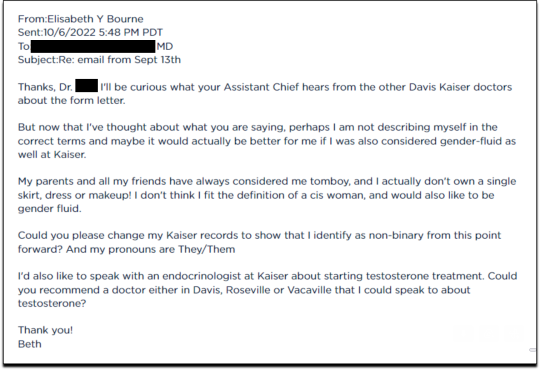
Fifteen minutes later I received an email from another Kaiser doctor informing me that my medical records had been changed, and that once my primary doctor returned to the office, I’d be able to speak with her about hormone therapy.
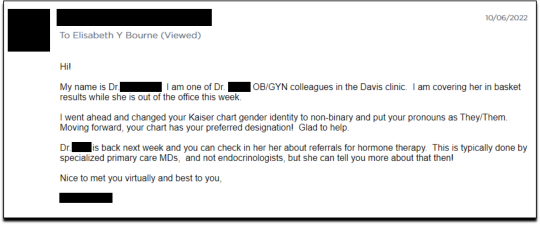
I responded the following day (October 7, 2022), thanking her for changing my records, and asking if she could connect me with someone who could help me make an appointment for “top surgery” (i.e., a cosmetic double mastectomy) because my chest binder was rather “uncomfortable after long days and playing tennis.”
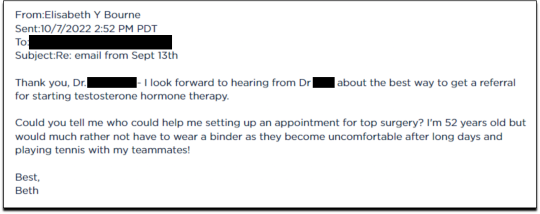
She told me to contact my primary care MD to “get things rolling,” and that there were likely to be “preliminary evaluations.”

Six days after contacting my primary care MD for a referral, I received an email from one of Kaiser’s gender specialists asking me to schedule a phone appointment so she could better understand my goals for surgery, so that I could get “connected to care.” This call to review my “gender affirming treatment options and services” would take 15-20 minutes, after which I would be “booked for intake,” allowing me to proceed with medical transition.
This wasn’t an evaluation of whether surgical transition was appropriate, it was simply a meeting for me to tell them what I wanted so that they could provide it.
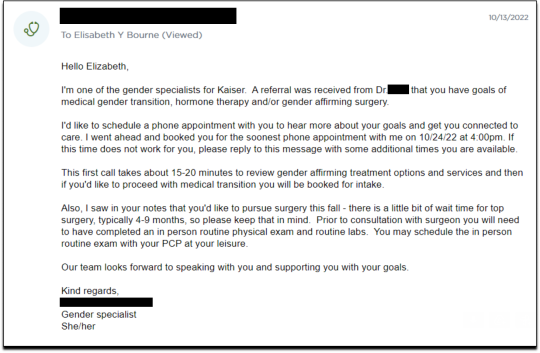
On October 18, I had my one and only in-person appointment in preparation for top surgery. I met in Davis with my primary care physician, Dr. Hong-wen Xue. The assessment was a 10-minute routine physical exam that included blood tests. Everything came back normal. Notably, there was not a single question about why I wanted top surgery or cross-sex hormones. Nor was there any discussion of the risks involved with these medical treatments.
The following week, on October 24, I had a phone appointment with Rachaell Wood, MFT, a gender specialist with Kaiser Sacramento. The call lasted 15 minutes and consisted of standard questions about potential drug use, domestic violence, guns in the house, and whether I experienced any suicidal thoughts. There were no questions from the gender specialist about my reasons for requesting a mastectomy or cross-sex hormones, or why I suddenly, at 52, decided I was “nonbinary.”
After the call, Kaiser emailed me instructions about how to prepare for my pre-surgery intake video appointment to evaluate my mental health, scheduled to take place on November 15. The email stated that prior to my appointment, I should research hormone risks on the WPATH website, and to “research bilateral mastectomy and chest reconstruction surgery risks and recovery” on Kaiser’s website.
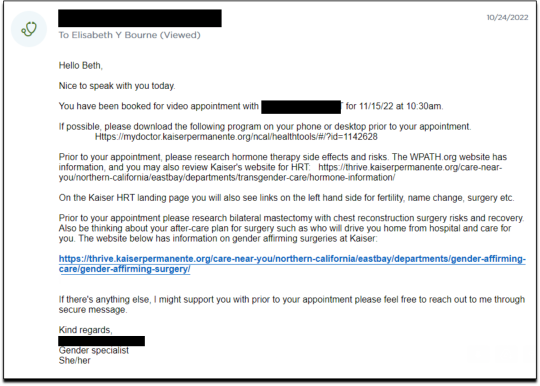
I decided to request a “gender-affirming” double mastectomy and phalloplasty. Kaiser sent me a sample timeline for gender transition surgery preparation (see below) that you can use as a reference for the process. I also asked for a prescription for cross-sex hormones (testosterone) as needed and recommended by Kaiser.
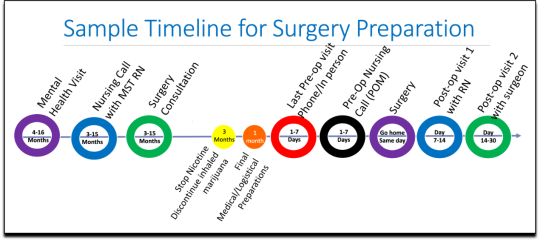
[ Source: Kaiser Permanente, Top Surgery - EXPLORING YOUR SURGICAL OPTIONS ]
Pre-Surgery Mental Health Video Appointment, Part I
This “Mental Health Visit” assessment was conducted over Zoom. The Kaiser gender specialist started with questions addressing my marital status, race, gender identity, and other demographics. She asked whether I was “thinking of any other surgeries, treatments in the future.” The list she read included “gender-affirming” hysterectomies, bottom surgeries such as metoidioplasty and phalloplasty, vocal coaching, support groups, and body contouring. “Anything else you might be interested in doing?” she asked. I said that I’d perhaps be interested in body contouring. I was also assured that all the procedures would be covered by insurance because they were considered “medically necessary.”
I dropped in several red flags regarding my mental health to see the reaction, but all were ignored. For instance, I revealed that I had PTSD. When the therapist asked me about whether I had experienced any “childhood trauma,” I explained that I grew up in Mexico City and had been groped several times and had also witnessed men masturbating in public and had been grabbed by men in subways and buses. “I was a young girl, so [I had] lots of experiences of sexual harassments, sexual assault, just the kind of stuff that happens when you are a girl growing up in a big city.” “So, you know,” I finished, “just the general feeling that you are unsafe, you know, in a female body.”
The therapist did not respond to my disclosure that trauma could be the cause of my dysphoria. Instead of viewing this trauma as potentially driving my desire to escape my female body through hormones and surgery, she asked whether there is anything “important that the surgery team should be aware of” regarding my “history of trauma,” such as whether I’d be comfortable with the surgeon examining and marking my chest prior to surgery.
When asked about whether I had had any “psychotic symptoms,” I told her that while I had had no such symptoms, my mother had a delusional nervous breakdown in her 50s because she had body dysmorphia and became convinced she had a growth on her neck that needed to be removed. I told her that my mother was then admitted to an inpatient hospital for severe depression. I asked her whether she ever sees patients with body dysmorphia and whether I could have potentially inherited that from my mother. She told me that psychosis was hereditary, but that it was “highly unlikely” that there was any connection between body dysmorphia and gender dysphoria.
I enthusiastically waved more mental health red flags, waiting to see if she would pick up on any of them.
I’m just wondering if my feelings, or perseverating, or feeling like these breasts make me really unhappy and I just don’t want them anymore!...I’m just not sure if that’s a similar feeling to body dysmorphia? How do you decide which one is gender dysphoria and general body dysmorphia, and just not liking something about your body? Feeling uncomfortable with your body? And I did have an eating disorder all through college. I was a distance runner in college so I had bulimia and anorexia, you know. So I don’t know if that’s related to gender dysphoria?
The therapist replied, “I completely appreciate your concerns, but I am going to ask you questions about your chest, about your expectations. And then I’ll be able to give you an assessment.” She also said the main difference between my mom’s situation and mine was that my mom didn’t really have a growth on her neck, whereas it’s “confirmed” that I actually have “chest tissue.” Furthermore, she said that while “historically there has been all this pressure on patients to be like ‘Are you really, really sure you want hormones? Are you 100% sure?’ We are a little more relaxed.” She continued, “As long as you are aware of the risks and the side-effects, you can put your toe in the water. You can stop ‘T’ [testosterone], you can go back and do it again later! You can stop it! You can stop it! You know what I mean?”
Because we ran out of time, I scheduled a follow-up phone meeting on December 27, 2022 with a different gender specialist to complete my mental health assessment for top surgery.
Pre-Surgery Mental Health Video Appointment, Part II
During this meeting, Guneet Kaur, LCSW, another Kaiser gender specialist (she/her/they/them pronouns) told me that she regretted the “gatekeeping vibe” of the meeting but assured me that since I have been “doing the work,” her questions are essentially just a form of “emotional support” before talking with the medical providers.
She asked me about what I’d been “looking into as far as hormones.” I told her that I’d be interested in taking small doses of testosterone to counterbalance my female feelings to achieve “a feeling that’s kind of neutral.”
When she asked me about me “not feeling like I match on the outside what I feel on the inside,” I dropped more red flags, mentioning my aversion to wearing dresses and skirts.
I don’t own a single dress or a skirt and haven't in 20 years. I think for me it’s been just dressing the way that’s comfortable for me, which is just wearing, jeans and sweatshirts and I have a lot of flannel shirts and, and I wear boots all the time instead of other kinds of shoes. So I think it’s been nice being able to dress, especially because I work from home now most of the time that just a feeling of clothing being one of the ways that I can feel more non-binary in my everyday life.
She responded, “Like having control over what you wear and yeah. Kind of that feeling of just, yeah, this is who I am today. That’s awesome. Yeah.”
She then asked me to describe my dysphoria, and I told her that I didn’t like the “feeling of the female form and being chesty,” and that because I am going through menopause, I wanted to start taking testosterone to avoid “that feeling of being like this apple-shaped older woman.” “Good. Okay, great,” she responded, reminding me that only “top surgery,” not testosterone, would be able to solve my chest dysphoria. (Perhaps it was because all these meetings were online, they didn’t notice I’m actually fit and relatively slender at 5’-5” and 130 pounds, and not apple-shaped at all.)
She told me that we had to get through a few more questions related to my medical history before “we can move on to the fun stuff, which is testosterone and top surgery.”
The “fun stuff” consisted of a discussion about the physical and mood changes I could expect, and her asking me about the dose of testosterone I wanted to take and the kind of “top surgery” technique I’d prefer to achieve my “chest goals.” She told me that all or most of my consultations for surgeries and hormones would be virtual.
The gender specialist told me after the appointment, she would submit my referral to the Multi-Specialty Transitions Clinic (MST) team that oversees “gender expansive care.” They would follow up to schedule a “nursing call” with me to review my medical history, after which they’d schedule my appointment with a surgeon for a consultation. Her instructions for this consultation were to “tell them what you’re wanting for surgery and then they share with you their game plan.”
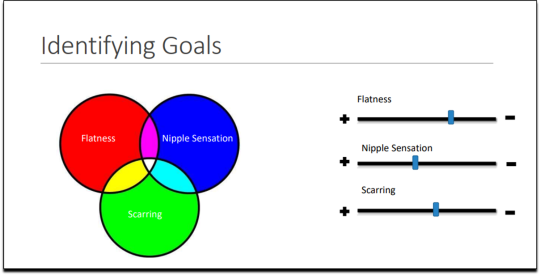
[ Decision-making slide to help me identify my goals for top surgery–flat chest, nipple sensation, or minimal scarring. Source: Kaiser Permanente, Top Surgery - EXPLORING YOUR SURGICAL OPTIONS ]
She told me that Kaiser has a team of plastic surgeons who “only work with trans and nonbinary patients because there’s just so much need for them.” She asked about my priorities for chest surgery, such as whether I value flatness over nipple sensation. I learned about double incision top surgery with nipple grafts, as well as “keyhole,” “donut,” “buttonhole,” and “Inverted-T” top surgeries.
By the end of the hour-long appointment, I had my surgery referral and was ready for my “nursing call” appointment.
Nursing call with Nurse Coordinator from the Transgender Surgery and Gender Pathways Clinic at Kaiser San Francisco
On January 19, 2023, I had my nursing call with the Nurse Coordinator. He first said that “the purpose of this call is just for us to go through your chart together and make sure everything’s as accurate as possible.” Once that was done, my referral would be sent to the surgeon for a consultation.
He asked me about potential allergies and recreational drug use, and verified that I was up to date on mammograms, pap smears, and colon cancer screenings, as well as vaccines for flu and COVID. I verified my surgical history as well as my current medications and dietary supplements.
He told me about a “top surgery class” available for patients where one of the Kaiser surgeons “presents and talks about surgical techniques and options within top surgery,” and includes a panel of patients who have had top surgery. I signed up for the February 8th class.
Within 10 minutes he told me that he had “sent a referral to the plastic surgery department at Kaiser Sacramento,” and that I should be hearing from them in the next week or two to schedule a consultation.
Appointment for Testosterone
On January 27, I had a 13-minute online appointment with a primary care doctor at Kaiser Davis to discuss testosterone. The doctor verified my name and preferred pronouns, and then directly asked: “So, what would you like to do? What kind of physical things are you looking for?”
I told her I wanted facial hair, a more muscular and less “curvy” physique, and to feel stronger and androgynous. She asked me when I wanted to start, and I told her in the next few months. She asked me if I was menopausal, whether I had ovaries and a uterus, although that information should have been on my chart.
The doctor said she wanted me to come in to get some labs so she could check my current estrogen, testosterone, and hemoglobin levels before starting hormones. Then “we'll set the ball in motion and you'll be going. We’ll see you full steam ahead in the direction you wanna go.”
That was it. I made an appointment and had my lab tests done on February 12. My labs came back on February 14, and the following day, after paying a $5 copay at the Kaiser pharmacy, I picked up my testosterone pump. That was easy!
Top Surgery Consultation
On the same day I received my labs, I had a Zoom surgery consultation with Karly Autumn-Kaplan, MD, Kaiser Sacramento plastic surgeon. This consultation was all about discussing my “goals” for surgery, not about whether surgery was needed or appropriate.
I told the surgeon that I wanted a “flatter, more androgynous appearance.” She asked me some questions to get a better idea of what that meant for me. She said that some patients want a “male chest,” but that others “want to look like nothing, like just straight up and down, sometimes not even nipples.” Others still wanted their chest to appear slightly feminine and only “slightly rounded.” I told her that I’d like my chest to have a “male appearance.”
“What are your thoughts about keeping your nipples?” she asked. “Are you interested in having nipples or would you like them removed?” I told her that I’d like to keep my nipples, but to make them “smaller in size.” She asked me if I’d like them moved to “the edge of the peck muscle” to achieve “a more male appearance.” I said yes.
I was asked to show my bare chest from the front and side, which I did. Then she asked me how important it was for me to keep my nipple sensation. I replied that it was important unless it would make recovery more difficult or there were other associated risks. She highlighted the problem with the free nipple graft, saying that removing the nipple to relocate it means “you're not gonna have sensation in that nipple and areola anymore.” However, some nipple sensation could be preserved by keeping it attached to “a little stalk of tissue” with “real nerves going to it,” but that would require leaving more tissue behind. I told her I’d go for the free nipple graft to achieve a flatter appearance. It was also suggested I could skip nipple reconstruction entirely and just get nipples “tattooed” directly onto my chest.
She told me I was “a good candidate for surgery,” and put me on the surgery wait list. She said that the wait time was between three and five months, but a cancellation could move me up to a sooner date. Also, if I wanted surgery as soon as possible, I could tell the surgery scheduler that I’d be willing to have any of the other three surgeons perform my mastectomy. Outpatient top surgery would cost me a copay of $100.
They contacted twice, in February and March, notifying me of cancellations. If I had accepted and shown up on those dates, they would have removed my breasts. This would have been less than five months from the time I first contacted Kaiser to inform them of my new “nonbinary” gender identity.
How Far Can I Go?
I decided to see how easy it would be for me to get approved for a phalloplasty. Known euphemistically as “bottom surgery,” phalloplasty is the surgical creation of an artificial penis, generally using tissue from the thigh or arm.
I sent an email on March 1, 2023, requesting to have a phalloplasty and concurrent hysterectomy scheduled alongside my mastectomy.
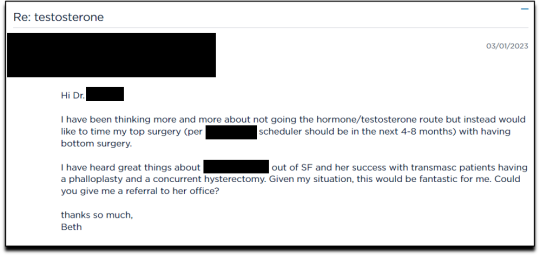
Two weeks later, on March 16th, I had a 16-minute phone call with a gender specialist to discuss my goals for bottom surgery and obtain my referral.
During the call, I explained to the specialist that I wasn’t sure about taking testosterone anymore because I was already quite athletic and muscular, and that taking testosterone didn’t make much sense to me. Instead, I wanted bottom surgery so that I wouldn’t feel like my “top” didn’t match my “bottom.” I told her:
But what I really wanted was to have bottom surgery. So this way when I have my top surgery, which sounds like it could be very soon, that I’ll be aligned, that I won’t have this sense of dysphoria with one part of my body and the other part feeling like it matched who I am. So yeah. So I just did a little bit more research into that. And I looked at the resources on the Kaiser page for the MST clinic and I think I know what I want, which is the hysterectomy and then at the same time or soon after to be able to have a phalloplasty.
I told her that I wanted to schedule the top and bottom surgery concurrently so that I wouldn’t have to take more time off work and it would save me trips to San Francisco or Oakland, or wherever I had to go for surgery.
None of this gave the gender specialist pause. After a brief conversation about some online resources to look over, she told me that she would “submit the referral now and we’ll get this ball rolling.”
Bottom surgery would cost me a copay of $200, which included a couple of days in the hospital for recovery.
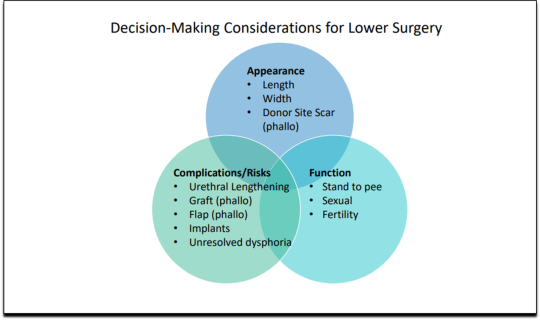
Phalloplasty Surgical Consultation with Nurse Coordinator
On May 16, 2023, I had a short surgical consultation with a nurse coordinator to go through my medical history. This was similar to the consultation for top surgery but included information about hair removal procedures for the skin on my “donor site” that would be fashioned into a makeshift penis. They also went over the procedures for determining which donor site—forearm or thigh—was more viable.
After only 15 minutes, she submitted my referral to the surgeon for another surgical consultation.
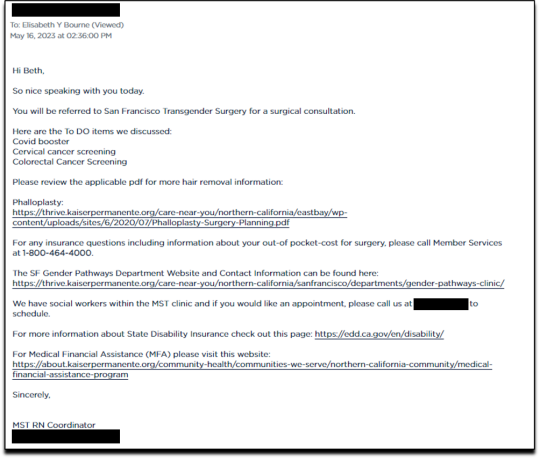
On May 25 I received an email from my phalloplasty surgeon’s scheduler, informing me that they have received my referral and are actively working on scheduling, but that they are experiencing delays.
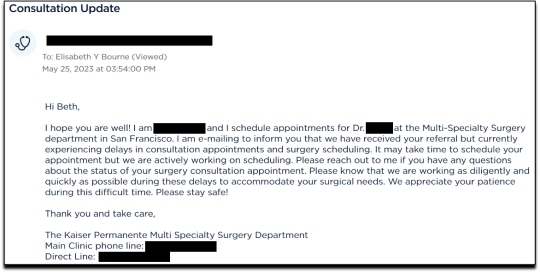
I ended my investigation here once I had the referral for the top and bottom surgery. I never used my testosterone pump.
Final Thoughts
In fewer than 300 days, based on a set of superficial and shifting thoughts about my gender and my “embodiment goals” triggered by the mere mention of “gender” in a form letter from my primary care physician, and driven by what could only be described as minor discomforts, Kaiser Permanente’s esteemed “multi-disciplinary team” of “gender specialists” was willing, with enthusiasm—while ignoring mental health concerns, history of sexual trauma, and rapidly escalating surgical requests—to prescribe life-altering medications and perform surgeries to remove my breasts, uterus, and vagina, close my vaginal opening, and attempt a complex surgery with high failure and complication rates to create a functionless representation of a penis that destroys the integrity of my arm or thigh in the process.
This describes the supposedly meticulous, lengthy, and safety-focused process that a Kaiser patient must undergo to embark on a journey to medically alter their body. No clinician questioned my motivations. No one showed concern that I might be addressing a mental health issue through radical and irreversible interventions that wouldn’t address my amorphous problems. There were no discussions about how these treatments would impact my long-term health, romantic relationships, family, or sex life. I charted the course. The clinicians followed my lead without question. The guiding issue was what I wanted to look like.
No other medical field operates with this level of carelessness and disregard for patient health and welfare. No other medical field addresses issues of self-perception with surgery and labels it “medically necessary.” No other medical field is this disconnected from the reality of the patients it serves.
Kaiser has traded medicine for ideology. It’s far beyond time we stop the ruse of considering “gender-affirming” interventions as anything approaching medical care.
This isn’t the first time Kaiser Permanente has been in the news for completely disregarding medical safeguards in the name of “gender-affirming care.” As girls, Chloe Cole and Layla Jane became convinced that they were born in the wrong body and were actually boys on the inside. Doctors at Kaiser ignored their underlying conditions and instead prescribed testosterone and removed their breasts. Both Cole and Jane have since detransitioned and are currently suing Kaiser.
The fact that children and vulnerable adults are being exploited in this massive ideological experiment is not just tragic; it’s deeply disturbing, especially considering it has evolved into a billion-dollar industry.
I hope that by sharing my story, I can bring more focused scrutiny to the medical scandal unfolding not just at Kaiser but also at medical centers and hospitals across the Western world. These institutions have completely abandoned medical safeguards for patients who claim to be confused about their “gender,” and I aim to awaken more parents and assist them in protecting their children.
--
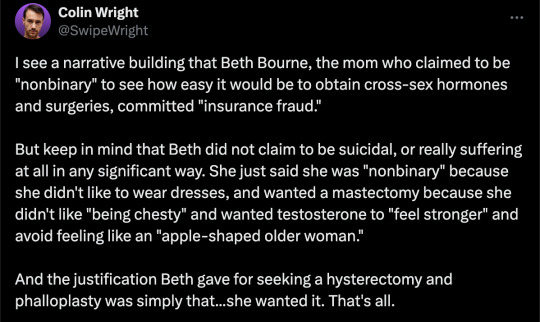
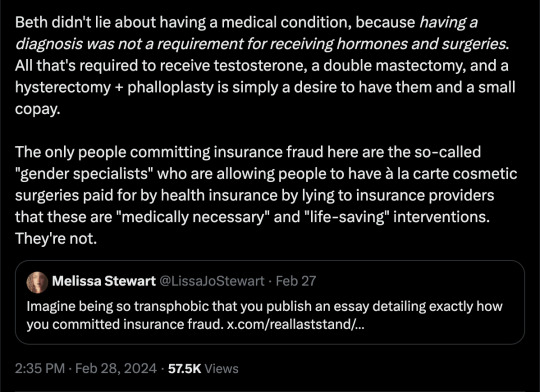
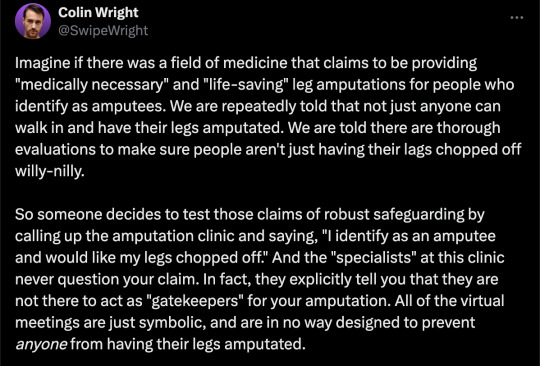
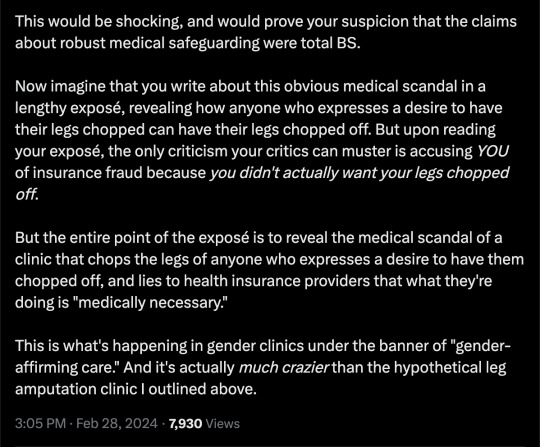
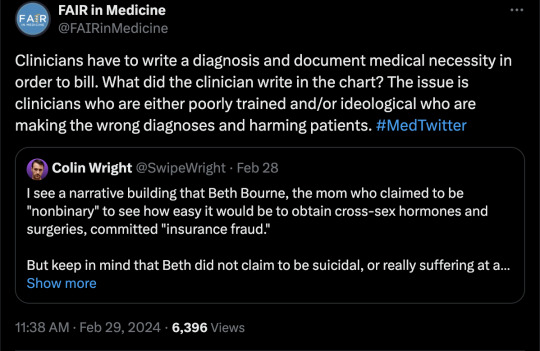
==
This is completely insane.
Apologists online are running around saying, but she didn't mean it, she was lying, she was pretending...
It doesn't matter.
Any kind of security, penetration or integrity test is insincere too. When security researchers compromise Microsoft's operating system or Google's browser or whatever, "but they didn't mean it" is not a defence to a discovered security flaw. It doesn't matter that the security researchers didn't plan to steal data or money or identities. The flaw in the system is there regardless.
It doesn't matter that it was insincere. Because the workers didn't know that. They never checked, never asked questions, never tested. They had been taught and instructed to never ask any questions. They did what they were supposed to. And the system failed spectacularly. Because that's what "gender affirming care" means.
Additionally, the claim that Beth Bourne committed fraud is an outright lie. A patient cannot bill. They do not have the authority. The medical clinic is the only one that can bill, and they must supply a diagnosis and a medical necessity.
If they didn't diagnose her and just wrote down what she said, then they committed fraud. If they claim they did diagnose her, then they committed fraud, because the diagnosis they concocted was bogus. This, by the way, is actually going on. Clinics are reporting fake endocrine and other disorders to get blockers, hormones and other interventions. Jamie Reed and other whistleblowers have documented evidence of this. Beth Bourne is not responsible for what the clinic does. They have medical licenses and legal responsibility. Not her.
Additionally, anyone who actually read the article would know how she tested the system. She said things like, "I've always been not that feminine. So, maybe I get my boobs removed." And they said, "sure." Instead of saying, "wait, why do you think that?" Framing it as her lying is itself a lie. They violated their ethical obligations. That much is incontrovertible. And it's directly the result of "gender affirming care," where clinics and clinicians rubber-stamp anything deemed "trans" based entirely on ideological, not medical, grounds.
#Beth Bourne#undercover#undercover investigation#gender identity ideology#queer theory#nonbinary#non binary#top surgery#bottom surgery#double mastectomy#bilateral mastectomy#gender affirming care#gender affirming healthcare#gender affirmation#affirmation model#medical scandal#medical malpractice#medical corruption#religion is a mental illness
826 notes
·
View notes
Text
Messages of Self-Care

Hi, Hexlings!
This pick-a-card reading is all about what kind of self-care you need right now in your life, etc.
This is a general reading, remember to take what resonates and leave what does not. This reading does not supplement your need to seek professional help. Tarot should be used as entertainment and not a for sure answer to your problems but as a guide, a sense of hope, and amusement.
Take your time when choosing your pile. Ask yourself the question and choose the picture that you can’t stop looking at. Listen to your intuition.
MasterList
Patreon Link
Ko-Fi Donations
Next Up: What's Your Fairytale Love Story? (Patreon, This Week)

Pile l:
What Kind of Self-Care Do You Need Right Now? Tarot: 2 of Wands, 5 of Pentacles, 3 of Pentacles (reversed), 4 of Swords, 6 of Pentacles
Balance & Courage. Right now in your life, you are lacking balance. This could be in any area of your life but for most of you, there is a misalignment with your finances as you have 3 pentacle cards establishing that this reading is specifically finance-focused. There is a mix in this pile as some of you may possibly have issues with spending money because the way you spend money is a coping mechanism of a way that you can remain in control of your life or feel better when things are going wrong. Others of you finances are tight because of your job not paying enough for you to survive but there are some of you that are being paid enough you just suck at budgeting. The remainder of you are giving away your money to others way too much when they are in need without holding people accountable in paying you back because you don't want "drama." Either way, you are looking for a break financially so you can rest and not stress every second of the day about not having enough money to pay for things you need in order to survive or have a roof over your head. This message of self-care is your cue for most of you who have ideas of plans to do better than what you are doing to chase after those ideas and goals. Now is a better time than never. I am hearing if you start now in implementing your ideas/goals withing 6-8 months you should see some sort of return that will look like the 10 of Cups/Pentacles. Last message for this group has to deal with your mentality around money. I may suggest looking into LOA (law of attraction), Neville Goddard, and other teachings in dealing with your mentality around money if you are a part of the spiritual community (Tumblr has a lot of resources). Others who are religious...pray to your spirit team and god to help move you in the direction or remove things not needed in order to bring in your financial break.
Extra Messages: Similar to how you choose a card. Close your eyes, take a deep breathe, open them, and whatever word stands out to you meditate on that word for a message to come through for you. Too many messages for me to type out.
Freedom, Beauty, Commitment, & Forgiveness

Pile ll:
What Kind of Self-Care Do You Need Right Now? Tarot: The Star (reversed), 8 of Wands, The Moon, 5 of Cups, Knight of Pentacles (reversed)
Release. Healing. Self -Love. There are many messages for you here pile ll. Some of you are dealing with depression, grief, or some sort of emotional loss because you are either have to let go of something or someone who isn't good for you or you are not happy with your current life right now. Others of you are lacking between self-love and self-care. You are not taking care of yourselves but this is more so in a self-love kind of way. You are talking down to yourself and hiding in the shadows not wanting people to see you. I was about to continue that sentence but then I caught myself and realized I was about to list the signs of depression (not a doctor only going off from experience and what I was medically diagnosed). Those who resonate with being unhappy with your life you are unhappy because you are not taking the steps that you are needing to take in order to get to where you want to be. Some of you want your manifestations, wants, and desires to land in your lap and that's not going to happen. You need to put in some sort of work. The wild thing is you know what you need to do and for some of you the thing is simple but you are overthinking it. For others of you the thing is scary and you hate the unknown and fear failure. For those who are dealing with self-esteem issues and insecurities, you is kind. You is beautiful/handsome/a cutie/etc. You is amazing. You need to be your own hype man. Find something that you like and hype yourself up from there and don't tell me you don't have one thing you like about yourself. It can be something as small as you like your left toe. Start there and build yourself up. If you are still stubborn and refuse to see one good thing about yourself ask someone you trust what is one thing they like about you. Don't demean it or cast it assign take the compliment and build off of that.
Extra Messages: Similar to how you choose a card. Close your eyes, take a deep breathe, open them, and whatever word stands out to you meditate on that word for a message to come through for you. Too many messages for me to type out.
Passion, Dreams, Protection, Transformation.

Pile lll:
What Kind of Self-Care Do You Need Right Now? Tarot: 3 of Wands (reversed), The Empress, 8 of Swords, 6 of Swords (reversed)
Stuck Energy. Some of you may have kind of been drawn to pile ll but not fully as this message kind of relates to some of that message but not fully. What I am saying is this pile's cards are straight forward when they tell me that you are dimming your light and also not wanting to let go of the old you for the new you because of XYZ reason. Some of you are holding yourself hostage in the same place mentally because either the people around you continuously keep triggering the old you or because you don't want to let go of those around you so you refuse to grow. Overall you are dimming your light to let other people shine and to hold yourself complacent and that's not ...that's not it my love. You are meant to shine bright in the light not hold yourself prisoner to the same song over and over again as if this is looney tunes hell. For those who have seen the original SpaceJam remember when Micahel Jordan agreed to stay stuck in the cartoon world if he lost and he would do the same thing over and over again (lose to basketball, sign autographs, do humiliating things, etc) that is your current energy right now. Break from the prison chains and see yourself for who you are. Step into your most authentic self and be dammed who doesn't like it. Be dammed with who all you lose. Remember that whatever you lose you gain back 10x forward. You lose your friends okay so what better friends who will align more with you are on the way. Don't be too uncomfortable with the idea of shining that you hold yourself so far back that you miss out on life. Not just life but YOUR MOST ABUNDANT LIFE. Sorry for the all caps I just need that for dramatics and to emphasize how much you need to shine your inner light to the world. Someone needs your inner light and now. Maybe it's me. Maybe it's that one family member you thought hated you but doesn't. Who knows either way shine baby shine.
Extra Messages: Similar to how you choose a card. Close your eyes, take a deep breathe, open them, and whatever word stands out to you meditate on that word for a message to come through for you. Too many messages for me to type out.
WillPower, Talent, Good Luck, Clarity, Happiness, Peace, Answers.

Pile lV:
What Kind of Self-Care Do You Need Right Now? Tarot: Ace of Swords, 4 of Pentacles, Ace of Cups, 2 of Swords, 9 of Wands (reversed)
Pile lV you remind me of the meme where people make fun of moms and wives when they ask for help and it's not fast enough for you so you do it yourself then complain about having to do everything yourself even though help is right there. I'm getting the sense you don't ask for anything, but for some strange reason end up shocked when you get exactly that.....all for what?? To not be a bother, to be a "cool/easy girl/boy/person". I had a friend like you once...she would complain about something in her life and when I or a solution would come about she would be blind to the shit and get nothing done, just complain because it's easier than doing the work. It's easier than bothering someone. Some of you just like to have a struggle story because you think life hands out I struggled and concurred trophies. Why is that pile lv? Why do you refuse help? Why do you pride yourself in struggling when all you want is peace? Make it make sense...please. I'm not going to lie though for some of you I fall into this trap also of not allowing help because I know I will get it right the first time instead of leaving it up to the possibility of someone messing things up. But even so, there comes a time in your life when you need to ease up and let in help. Let in ease. Let in Peace. Let in this emotional and even mental fulfillment you are seeking. You can't bring that when you are constantly controlling things. I'm getting a specific message for a few of you asking god/universe/etc for help and when you get the help you go.."no not that kind of help" Beggars can't be choosers, my love. You have to give some type of way in order to achieve what your end goal is in life. Whatever that is for you..there are to many of you with different messages so take what resonates and leave what does not.
Extra Messages: Similar to how you choose a card. Close your eyes, take a deep breathe, open them, and whatever word stands out to you meditate on that word for a message to come through for you. Too many messages for me to type out.
Manifestation, Protection, Commitment, Lighten Your Load, Freedom, Good Luck, Financial Health.
Thank you for liking and reblogging my readings. I always appreciate you guys on here and on Patreon.
Stay safe and be blessed
#spirituality#tarot reading#witchblr#tarotcommunity#tarotblr#pick a card#tarot cards#pac tarot#pick a pile#pac reading#pick a photo#pick an image
168 notes
·
View notes
Text
Lae'zel is Autistic

(Note: This post was written by someone with professionally diagnosed autism. A lot of what I'm about to say of Lae'zel, I can personally relate to! This is not intended as negativity or hatred of her character; rather, it is one of the reasons I adore her.)
-----
I really don't like that the writers have attempted to tone down Lae'zel's "rudeness" perceived by the larger fanbase. It reminds me too much of how "rudeness" is so often less about hostility and more about one's ability to perform social interactions to the standards of neurotypical people. So for the writers to decide that Lae'zel is too "rude" for not saying her please and thank yous every time she speaks, for being direct, for struggling to have two-sided conversations... well, to me, that's just saying that there was something wrong with her they felt the need to fix. I spent years with people trying to "fix" me in special ed. To teach me how to present as neurotypical, like memorizing appropriate responses to common questions, and pretending to hold eye contact by looking at people's lips. While I will admit it helps me in the workplace for example to perform these things, it also taught me to hate myself for being faulty in the first place. That's something I still struggle with to this day. So when a character like Lae'zel comes along, who I can relate to in her coded autism, I don't want to see her changed. I want to see her celebrated.
Here are some of the signs of autism I've noticed in Lae'zel:
Difficulty regulating and understanding emotion:
Lae'zel is a very passionate person, and can get carried away by that passion. At the same time, she is not very good at self-inventory of her emotions. After she defies Vlaakith in Act 3, she asks the player to help her understand what she is feeling, because she cannot place it herself.
Directness:
As said above, Lae'zel is vert blunt in the way she communicates. If you've picked up the game only in later patches, let me tell you that she was originally even more so. If the player asks Lae'zel why she is the way she is, she says it's just because she is githyanki. While I certainly think some of this could be attributed to a difference in culture, we meet other githyanki, and they do not carry the same speech and manner she has.
Taking things literally:
Lae'zel equally does not understand indirectness from others, or idioms. For example, when Shadowheart asks if they have "buried the hatchet" between them, (an American idiom to mean "making peace" which by the way, is not a very appropriate idiom,) she answers with "why would I bury a weapon?" Again, this could be attributed to a difference in background, but nonetheless something to relate to.
Dislike of small talk:
Literally the first thing Lae'zel says to you after you recruit her is, "chatter already? Tas'ki."
Inflection:
Lae'zel is voiced with minimal modulation of intonation or pitch. As such, she sounds monotone and serious, even when the words she says are lighthearted or joking.
Difficulty handling change of routine/expectancy:
When things do not go as Lae'zel is determined they are supposed to go--for example, the machine she thinks will remove her tadpole not working as she believed it would--she has wild, uncontrolled outbursts.
-----
There's probably even more one could list here, but for now I'm done. I may edit this later, though.
263 notes
·
View notes
Text
Its honestly terrifying that I'm the one educating healthcare professionals on my medical condition. When I was hospitalised for my tics I was attended to by psychiatrists and asked questions about whether I was hearing voices and similar such things. To those who don't know Tourettes is a neurological condition, I should have seen neurologist rather than psychologists and psyciatrists. I was put on anti psychotics for months that ruined my mental health and did nothing to improve my tics. The wariness from this situation led to me refusing and hating medications for period of time, making situations far worse.
A psychiatrist diagnosed me with Tourettes. He was not qualified to do that, only a neurologist can diagnose Tourettes. When I went to see a neurologist who we were told specialised in tics Upon arrival, after months and months of waiting we were told:
oh yeah sorry this is too complex for me. I don't really know anything about tourettes.
I've been forced to educate myself because I just cannot trust doctors.
I've been told things from "oh everyone gets that" too you just need to sleep more, eat spinach, you're too stressed about school.
It's scary when the people who hold your life in their hands don't understand the basics of your medical condition.
My situation is better than most. I have been extremely privileged where my family could afford private health and the many treatments, specialists and medication I need to not suffer and be able to live my life. This is how bad it is for me, you can imagine how much worse it is for people who cannot access this healthcare. People who don't have the option to go to the hospital in case of emergency, people who can't afford to switch doctors until they find one that takes them seriously, people who can't afford medications.
#disability#disabled#disabled advocacy#disability vent#actually disabled#tics#tourettes#tourettes syndrom#tics and tourettes#touretes medications#disabilities#disability advocacy#living with disability#healthcare system#invisible disability#tic disorder#tourettes syndome#tourettes awareness#tic attack#actually tourettic#tic punk#disability awareness
101 notes
·
View notes
Note
WIBTA if I told my partner to stop bringing up the fact that they're undiagnosed
Submitted: 19/04/2024
(💑♾️)
I've (18FtM) been with my partner Brit (17F) for 3 years now, we met in high school and have since graduated. In that time, I've worked with multiple professional to seek therapy and diagnosis for my multiple conditions, two of them being ADHD (combination) and Autism. Brit along with my childhood best friend were actually the first people to suggest I could be Autistic and should look into evaluation for both, not just ADHD, which I had been suspecting for a while. Obviously I was excited about my diagnosis because I am finally recognised and am able to get accommodations, talk about it outside my immediate circle of friends and accept myself without doubt that I have this.
Immediately after my diagnosis, I started to talk to Brit about how amazing it feels. And how excited I am to be able to have an explanation for a lot of my issues both growing up and currently, accommodations and other things too. Brit suspects they are likely autistic too and used to think they had ADHD before being evaluated, and it returned with a negative result. I still think they feel annoyed about, since they constantly bring up the fact that they don't think the evaluation was accurate because they lied during it to make their symptoms seem less obvious out of fear of the diagnosis at the time. They've tried to ask their mom to be evaluated for Autism, but their mum refuses to, as she has multiple reasons to not believe that they do and refuses to think anything could be wrong with her child. Brit doesn't have enough money on their own to get an evaluation (Mine cost a couple of thousands, and that was on the cheaper end). I have been talking to Brit about my diagnosis for a few days and how happy I am and every time I talk about it, they constantly bring up how lucky I am and that I don't need to brag and saying “I wonder how that feels”. At first, I tried to understand what they are going through because I get what it's like to suspect you have something but not have the resources or the doctors that can properly evaluate you, but after the 5 or 6th time it feels very degrading, invalidating and demeaning. I don't understand why they can't just be happy for me as their partner and not let it reflect on them. I've been thinking about just telling them to shut up the next time they bring it up as it's really getting on my nerves, I feel that I have the right to be happy about the diagnosis and not have to worry about upsetting my partner for whatever personal battles they have going on with them. Furthermore, I do listen to them and comfort them when they're upset about their own experience, but it feels like they're making my own experience into their own. I've been thinking of texting them that being undiagnosed doesn't mean they can invalidate my experience and that it isn't all about them, that they can just be happy for me and that it feels like shit to be happy about something that someone else is so negative about even though it has nothing to do with me. So, WIBTA if I told my partner to be quiet about not being diagnosed
118 notes
·
View notes
Text
My Experience in Inpatient Psych
So I know a lot of people on here have talked about their experience in inpatient psych facilities, but I'd like to add mine just to give all you writers out there a writer-focused one. It's below the cut just in case you have to sit this one out for your own reasons.
To give you some background, I am 30 years old and have had hallucinations since about 16 and bizarre intrusive thoughts (someone living in my house that wasn't supposed to be there, somebody poisoned my walls, etc...) for about a decade, as well as very severe anxiety since I was about 3 years old. This is something not a lot of people know about me, even people I am friends with IRL.
The only thing I am actually diagnosed with is anxiety, which I'm starting to think is a failing of the psych systems I have been a part of. I have had counseling off and on and prior to this hospitalization I took escitalopram, aripiprazole, and gabapentin prescribed by my primary care doctor- all for the severe anxiety.
Quite frankly, I should have been in inpatient psych at least a few times before this, and it's by sheer dumb luck that I've survived to continue this blog.
On Friday, I was at home alone and made a few pretty bad decisions. I wont say what they were because frankly they're embarrassing, but they have to do with self-harm. I was scheduled to work Saturday and at about 9pm I realized that if I drove myself to work I would crash my car. Since my wife drives me sometimes, I figured I would just ask her to.
I told my wife and she asked- even if she drove me to work, since I was a nurse, would I be able to keep myself safe around insulin or other potentially dangerous drugs? I couldn't answer that question. We talked for a couple hours and came to the conclusion that I probably needed to go to the emergency department.
At this point I figured they would evaluate me and release me because I couldn't possibly meet the criteria for inpatient. I was wrong in this assumption. After telling them the decisions I had made that day, the feelings of wanting to die in a car crash, plus about a previous attempt, they recommended inpatient. Turns out, when you're a nurse, you can make some really bad life choices with the knowledge you have, and they didn't want to take any chances.
I was given paper scrubs to wear (so I couldn't hurt myself with my clothing or a hospital gown). I was also given a patient companion (someone who sits in the room and makes sure you don't hurt yourself).
They gave me the option of signing myself in voluntarily, or putting me on a writ of detention. A writ of detention is a piece of paperwork that allows a medical professional or law enforcement officer to hold someone for 3 days in a psychiatric facility against the person's will for the purposes of psychiatric treatment. Whether you sign the voluntary or get placed on a writ, you cannot sign yourself out. You need to wait until the psychiatrist taking care of you thinks you're ready to go.
I didn't believe at this point I needed to go inpatient, but I took the voluntary option because there are some perks, like being able to leave within 3 days if appropriate. At this point I was convinced I was probably going to have to call off work Saturday and Sunday, probably be out of the hospital Monday, have a few days to rest and be back at work on my next scheduled shift after that, which was Thursday.
Well, that's not what happened.
Because of some of the decisions I had made, along with bed availability, they wanted to keep me in the observation unit overnight before they sent me to psych. I stayed overnight in a unit that shares staff with the unit I work on, so I was taken care of by my coworkers. This was surprisingly not that bad. I like my coworkers and they were really professional about it.
Saturday I felt like I was in a fog all day. I couldn't watch TV. I couldn't color or write. I worked out some in my hospital room and paced the halls once or twice. Mostly I hung out with my wife and occasionally talked with my companion, but even talking was difficult. I had refused ativan because I felt like I had no hope of finding a medication that made me feel better, and I figured I didn't want to take the one medication that might actually work and then not be able to get it ever again.
Around 7PM I took a 45 minute ambulance ride to the facility. Getting my blood pressure taken is a big anxiety trigger for me, but my brain felt so scrambled that I couldn't express this well. They took it every 10 minutes on the ride there and by the time I got there it was in the 170s/100s (BP goes up when you're having severe anxiety). This was not their fault of course, but no matter how much I thought about telling them or refusing the BPs, I just couldn't do it.
When I got to the facility I was greeted by a tech who took my BP again (150s/90s this time), showed me around and looked through my personal belongings (basically just the clothing I came in with since my wife took my phone and wallet knowing I wouldn't be able to have them on the unit) to make sure I didn't have anything I wasn't allowed to on the unit. She showed me around my room and was really thorough with telling me how things worked, what the rules were, etc..
The rules included:
No patients allowed in other patients rooms
No personal belongings that had strings, belts, or laces, or that could be used as a weapon
No caffeine after lunch and no free access to caffeine
No personal electronics (including eReaders and watches). There was a TV in the day room and 2 phones mounted to the wall for patient use
A little later my nurse came into my room and asked me a ton of questions. Here's the thing about any hospital- you get asked the same questions over and over. By the time I'd gotten there I could give my story in under a minute. Or at least, that's what it felt like. There were only 2 clocks on the unit, at the nurses stations.
The unit itself was laid out in a "T" shape. There was a main nurse's station at the place where the two hallways intersected. At the end of the long hallway there was another smaller nurses station, a cafeteria/day room, and a "comfort room" which was a small room off the day room that had a collection of the oldest and worst donated books that have every come together on a bookshelf.
I did some pacing that night and then went to bed, but didn't sleep particularly well.
On Sunday morning the tech woke me up to take my blood pressure, which was, not unsurprisingly, still high. It was about 5 AM so I got up and paced the longer of the corridors for about an hour. Breakfast was served at 8 and the food wasn't that bad. The coffee was about the worst I'd ever drank, which I suppose helped with the no caffeine goals.
Just after breakfast I met with a psychiatrist on an iPad for about half a minute, and I'm not exaggerating there. The only questions he asked were whether I was suicidal and whether I would be fine with tripling my dose of aripiprazole in light of the hallucinations. I had had a 50-lb weight gain in the last year so I asked to switch my med. He switched the med to cariprazine. That was all.
I had a much longer meeting with my nurse later. All the nurses did an excellent job of assessing me, asked tons of questions, and it seemed like they really tried to figure out what was going on. That day I also met with a social worker, and a therapist, and a nurse practitioner. Each of them did an assessment to see what my needs were while I was there.
There was also a music therapy session where I cried my eyes out to Because of You by Kelly Clarkson.
I was really tired by the end of the day but I also didn't think I could sleep so I asked for trazodone. I should clarify that when I say "I" in this piece I really mean my wife convinced me to ask because I legitimately didn't believe I needed or deserved any of the things I asked for at this point. To my utter shock and surprise, they gave me the trazodone.
My first night on trazodone was amazing and I realized I hadn't slept well in a long time. With trazodone I fell asleep and stayed asleep until the blood pressure cart came rolling down the hallway at 5am. The second I got up on Monday morning I was wide awake.
I paced a lot Monday. I went to a goals session in the morning where I gave a goal to write 3/4 of a page. I didn't know if I could do it or what I was even going to write about, but I know I like to write and it might be a reasonable introduction to getting back to life.
I also was having kind of a rough day brain-wise. My brain was coming up with all the ways I could hurt myself in my room. There weren't a lot of them, but it was trying. I told the nurse during her assessment and she asked if I felt I could keep myself safe. I asked her what she would do if I said no. She said they could move me to a more secure part of the unit and give me more supervision. I knew what part of the unit she was talking about, and I didn't want to go there (no space to pace, and pacing was keeping me alive right then). So I told her I could keep myself safe (if anything, the idea of moving was good motivation to do stay safe in itself). I hallucinated some black and white blood cells falling from the ceiling and music coming out of my vents.
I also had another meeting with the social worker to figure out discharge plans. I voiced in the meeting that I wasn't sure that I could trust my wife, since it felt like at the time she was the one who exaggerated my symptoms to get me in here. The social worker said we had really good communication skills, since this was something I felt needed to be said in front of both of them and we both stayed really calm through the whole thing.
I finished the day with an art therapy session that really helped me turn a corner. The prompt was to draw the emotion(s) you felt right now on one side of the paper, and to draw the emotions you wished you could feel on the other side. For the first time I realized that my emotional state was actually really bad and that the suicidality hadn't come out of nowhere, and that I needed help.
When my wife came to visit later that night I was able to tell her about my breakthrough, even though I still felt a little bit like she had done something to get me in here and I still wasn't sure I needed to be inpatient.
Tuesday was a lot better. I felt like I had woken up out of some kind of fog and I had no idea how long I'd been in it. I went to goals group, a spiritual group, and group occupational therapy. My goal was to be more social and I made a friend and we paced together and worked out. I read a quarter of The Martian by Andy Weir (my wife brought it for me because the best thing on the bookshelf was Louis L'Amour). I wrote about how good I suddenly felt. Turns out, I thought, a few days of good sleep, lots of therapy, and a new medication or two will really change things.
A quick side note about The Martian. I highly recommend it to anyone who is chilling in a psych hospital but has the ability to read while they're there (I sure didn't the first few days). I don't really know why, but the first few times I read it, I felt like they had created this superhuman character in Mark Watney just so they could throw a ton of wild things at him for the story. This time reading it, as a suddenly not suicidal person, I realized anyone with Mark's skill would have done the same thing and not just died on Sol 7 to get it over with.
Wednesday I woke up not feeling nearly as good as Tuesday, but still like the fog had lifted. I was a little disappointed (I hallucinated my cat (thanks for coming to visit me, Corina), some spiders, and just felt kinda meh. But I remembered how good I felt the day before, and that really kept me hopeful about going home.
I saw the psychiatrist again and asked to go home. He joked a little about me staying till Christmas, but ultimately he said as soon as his note was in I could go. I ended up leaving at about 12:30 with my wife.
In the time since leaving I have required a lot of support from my wife. The medications are all locked up, so are the blades and anything I could use to hurt myself. My wife has me in eyeshot at all times. I can't drive due to intrusive thoughts, so she does all the driving now. I quit my job because I feel like it was a big part of why I ended up as bad as I was. As someone who has been a pretty independent person this is a big change of pace, but something that is really necessary to my healing.
Ultimately at the end of my hospital stay, I was prescribed escitalopram, gabapentin, trazodone, cariprazine, and then a few days later propranolol. I'm currently on a total of 5 psych meds and honestly I don't care one bit because its so much better than being not on them at this point in my life.
89 notes
·
View notes
Text
chronically ill/physically disabled people, how do you deal with doctors appointments? what do you say/do to advocate for yourself? im autistic and not diagnosed with a chronic illness yet and i really struggle to know what to say to get them to listen to me and understand so that i can get the help and care i need. even if i bring someone with me, they also need to know what to say and i don't know anyone who understands well enough to explain to the doctor for me, which means that i have to tell them what to say before going. but that's the problem since i just don't know.
i have chronic joint pain that ive had for years but has only gotten worse over time. i also have hypermobile knees which are the worse they've ever been right now. i'm chronically fatigued and barely have the energy to eat and do basic hygiene. i have a few friends that i talk to fairly regularly and im very thankful for them but i still struggle so much with maintaining a social life when i cant even maintain my own physical wellbeing. i only go outside when i absolutely have to/when my pain is low enough and i have enough energy. on average i probably leave my house about once or twice a week, usually to go to medical appointments, to an internship i have once a week or to go grocery shopping. i usually try to do both at the same time if i can (like going grocery shopping after my internship) but most of the time i have to ask my parents to get me groceries since i dont have enough energy to. all i want is to be able to go outside just to take short walks and enjoy nature and the fresh air but i can't do so without the right treatment/a mobility aid. everything im doing right now is bordering the line of too much. im constantly tired and overwhelmed and everything feels like a struggle, even the smallest tasks most people do everyday without thinking twice about it.
i have almost only had bad experiences with doctors and other medical professionals like physiotherapists, which has given me a lot of extra anxiety on top of my already pretty bad social anxiety. i really struggle to make appointments and even more so to go to them, and when i bring myself to do so i really struggle to express myself and explain how i feel and how i want them to help me. i almost always get shut down and offered no actual help with any of my problems. i just don't know what to do anymore.
if anyone has any advice i'd really appreciate it. i know that i can't give up because my life right now without accommodations is too miserable, but i also don't know how to move forward.
sorry if this was hard to understand. i really tried my best to explain but im having a bit of a hard time expressing myself right now due to feeling worse than usual.
#chronically ill#chronic illness#autistic#actually autistic#physical disability#physically disabled#mentally and physically tired#chronic illnesses#chronic pain#chronic fatigue#undiagnosed chronic illness#undiagnosed chronic pain#cripplepunk#crip punk#cripple punk#chronic illness rant#disabled#actually disabled#disabled rant#mobility aid#mobility aids#medical gaslighting#doctors appointment
123 notes
·
View notes
Note
I really appreciate your breakdown on all of this, it’s both enlightening and vindicating.
I am about 50kg (110lb) above my “recommended” weight and am still getting over my general upbringing that told me I am at fault for being so much bigger than my peers. I still get surprised every time I talk to professionals about it and they just shoot down my assumptions.
My GP told me my extra weight gain after changing my medication is not a concern because I am fit and healthy. My endocrinologist diagnosed my various hormonal conditions that I’ve had since puberty and made it clear that I wouldn’t be able to lose weight without actually starving myself, which of course he did not recommend. My psychiatrist responded to my anxiety about my weight by telling me about HAES paradigm- Healthy At Every Size - and that I should not chastise myself for something both beyond my control, and also not a concern. My first physical trainer, when I talked about wanting to lose weight, made it very clear that regular exercise would not help me lose weight. I saw a dietician and they made it clear that they would not feel comfortable trying to bring me down to a “normal” weight range but would be very happy to help me balance my nutritional needs and make sure I’m getting enough vitamins.
All of these certified professionals agreed - being big is not inherently a problem. And yet every time I see my parents they make at least one comment about how I need to be losing weight. And I know it’s because they care but it’s really disheartening. It’s also really exhausting trying to respond to them with what I’ve learned because even if I could cite my sources right then and there, they would still think I’m making excuses. Sometimes they believe my doctors but very often they respond with “okay but” and still insist I’m just not trying.
So yes I really really appreciate you standing your ground and trying to educate people despite all the naysayers. I’m sure your determination has helped people learn that maybe they can be happy with their bodies as they are.
I’m glad your professionals are getting it right. I’m sorry your parents aren’t. You might consider asking them to read Fat Talk: Parenting in the Age of Diet Culture, or You Just Need to Lose Weight (and 19 Other Myths About Fat People), but you may also want to set a firm boundary: don’t talk about my weight or I will hang up/leave the house and go back to the hotel.
178 notes
·
View notes
Text
People often ask me what my autism regression with Catatonia looks like and what was it like.
I’ve always known something was wrong. Before, I was working. I worked at a local fast food chain, and started having issues. I found it harder to mask, I found I was having more sensory issues, I found I was having meltdowns nearly everyday because of it. I was so confused. What was happening? I didn’t feel burnt out.
On top of that, I started having episodes that I thought were seizure activity but weren’t quite making sense. I’d freeze and not be able to move for minutes to hours. It was debilitating but not yet serious enough that and I thought maybe it was a shutdown or something like that.
I quit my job. It was becoming too much for me. I was no longer doing the right things, I was constantly overwhelmed and frustrated with myself. I could no longer work without supports, and my job wasn’t willing to give me those supports. So I quit.
After I quit, I felt like things started happening so quick. I started unmasking both willingly and unwillingly, I could no longer mask and that itself was overwhelming. I started losing skills. I was no longer able to bathe myself without intense prompting, and I was no longer independent with my IADLs and needed constant care and help. Not to mention my physical health started to decline. I started having more and more of those episodes of freezing, but just sorta shrugged it off.
Over time, my masking became basically nonexistent, I was stimming ALL. THE. TIME. Just to keep myself regulated. My sensory issues were out of control. I was no longer low support needs and started self isolating and felt severely depressed.
My freezing episodes started to get better, but I still needed prompting for basically everything, which was frustrating. I was no longer a person I recognized and it was bad. As time went on, my freezing episodes got worse again, and I started losing all skills you could think of. I struggled to do everything. My speech started declining more, and I started using AAC. Which was a newfound struggle.
I’m now slowly getting better, but I got a name for my freezing episodes now. Catatonia. Diagnosed by a professional who knew exactly what was going on. I’m everyday now trying to gain back the skills I lost and be more independent, but things are slow, and I will probably continue to lose skills just to try and gain them back again and repeat. Things are complicated, and this post doesn’t even say everything I went through and everything I want to say. This is just a baseline.
I’m working on getting better, but with continued regression it’s hard. It’s hard to do things when you need constant care and help. But I’m working everyday, and that’s what matters to me.
#zebrambles#autism#actually autism#medium support needs#actually autistic#autism catatonia#autism regression
146 notes
·
View notes